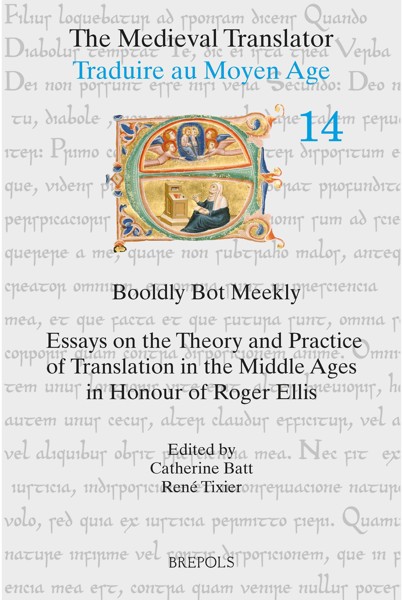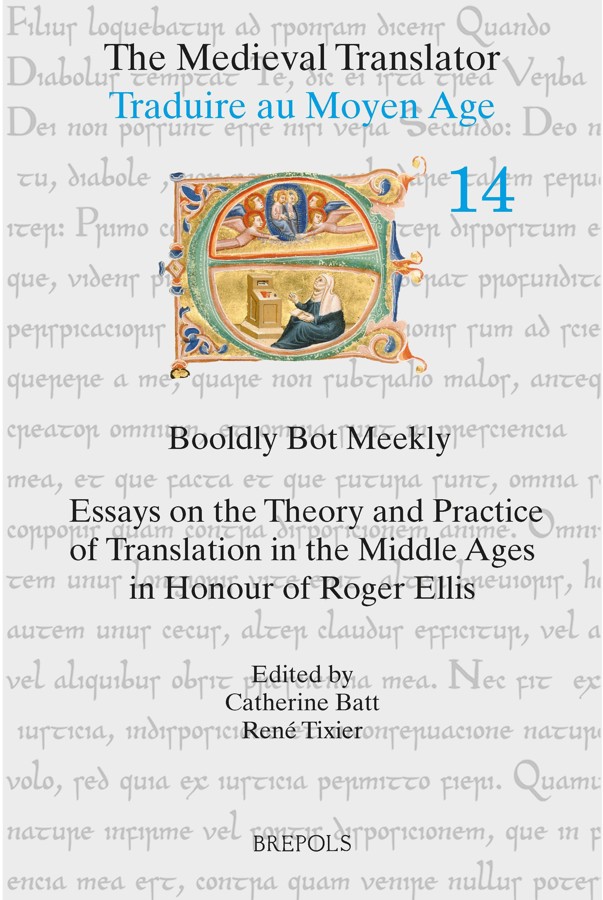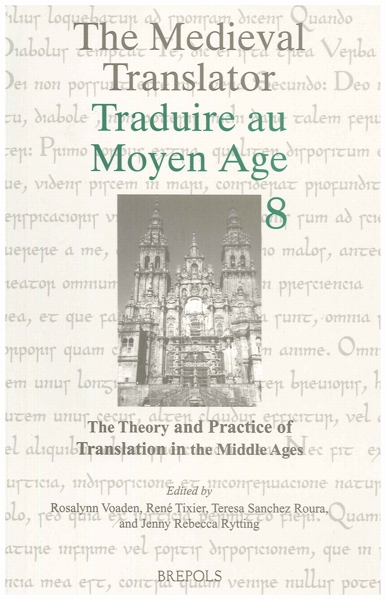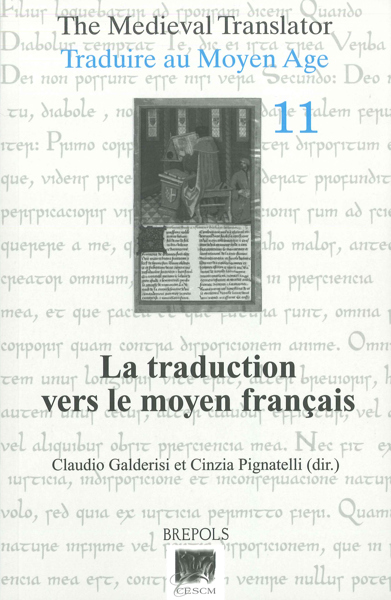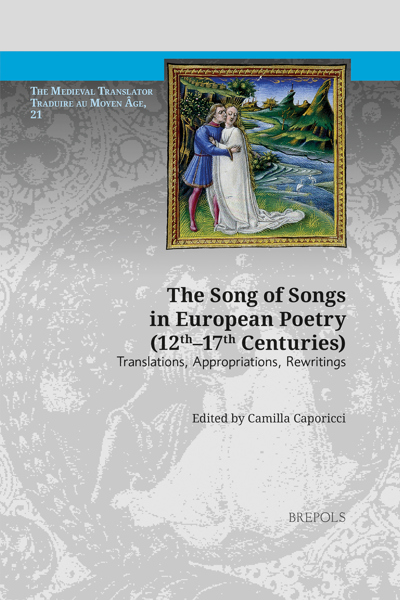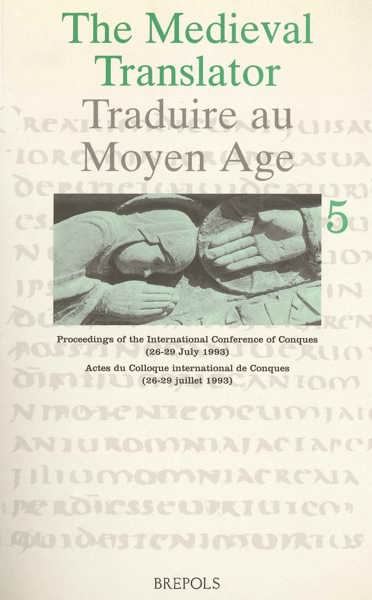
Booldly bot meekly
Essays on the Theory and Practice of Translation in the Middle Ages in Honour of Roger Ellis
Catherine Batt, René Tixier (eds)
- Pages: 619 p.
- Size:156 x 234 mm
- Illustrations:15 b/w
- Language(s):English, French
- Publication Year:2018
- € 100,00 EXCL. VAT RETAIL PRICE
- ISBN: 978-2-503-55380-1
- Paperback
- Available
- € 100,00 EXCL. VAT RETAIL PRICE
- ISBN: 978-2-503-55430-3
- E-book
- Available
When, back in the 1980s, Roger Ellis first sounded out academic colleagues in British universities and beyond about their possible interest and participation in a conference on medieval translation theory and practice, he perhaps did not envisage that the resulting gathering—intellectually curious, animated, convivial—at Gregynog Hall in Wales (1987) would be the first of a series of international conferences with a strong continental European base, which now provides a regular forum in which one can initiate, and engage with, research questions about this near all-encompassing aspect of medieval culture. Since that first meeting, the Cardiff Conferences on the Theory and Practice of Translation in the Middle Ages have charted and drawn anew the parameters of scholarly debate on the topic, while their Proceedings, hosted since 1996 by Brepols’ Medieval Translator series, cumulatively present a body of work valuable to anyone interested in translation in its medieval, broadly European, manifestations.
The contributors of this volume’s essays, assembled in tribute to Roger Ellis on the occasion of his seventieth birthday, have profited from the intellectual opportunities the Medieval Translator conferences foster, and in particular from Roger’s friendship and academic acumen. The essays draw in many cases on Roger’s work to inform a collective project that reflects on his specific interests in translation, including late-medieval piety and Birgittine texts, scholarly editions and studies of genre, considering literary and linguistic relations within and across languages, registers, national boundaries, time and space, refining, even re-defining, our understanding of translation. We offer these essays with warm thanks to and appreciation of Roger Ellis for his work in this field, not least for establishing, with this conference series, a means to demonstrate that translation, and translation studies, is above all a question of different voices speaking productively in dialogue.
1987 marque le début d’une série de colloques internationaux consacrés à l’étude de la théorie et de la pratique de la traduction au Moyen Âge sous ses nombreux aspects. Cet été-là se réunissait au Centre de Conférences de l’Université du Pays de Galles, Gregynog Hall, un groupe d’universitaires qui allait rapidement s’étoffer et essaimer en Europe, parallèlement à d’autres initiatives dans ces mêmes domaines. Ces rencontres stimulantes et conviviales ont donné naissance à des travaux dont la diffusion, assurée depuis 1996 par Brepols dans la collection ‘The Medieval Translator’, apporte aux enseignants et aux chercheurs, mais aussi à un plus large public, textes, outils d’analyse et éléments d’appréciation permettant d’entrer dans une connaissance plus approfondie d’un monde riche en diversités. C’est ainsi qu’aujourd’hui les ‘Cardiff Conferences’, comme elles furent dénommées dès leur origine, constituent un forum où sont régulièrement échangées et discutées les multiples questions que pose, à toute époque et en toute langue, la traduction des textes médiévaux de toute nature.
2013 est l’occasion d’une double célébration : le dixième colloque, accueilli par l’Université Catholique de Leuven, est le cadre du soixante-dixième anniversaire du fondateur de ces rencontres, Roger Ellis, dont l’énergie, l’enthousiasme et la confiance en l’avenir ont contribué à développer et renouveler cette discipline. Les études regroupées ici en son honneur sont autant d’échos de ses intérêts variés. Elles se répartissent, en un équilibre heureux, entre les témoins du christianisme médiéval, parmi lesquels la grande figure de Brigitte de Suède, particulièrement aimée et étudiée par Roger Ellis, et les auteurs et ‘translateurs’ de la littérature profane, en un mélange spontané où les frontières de surface entre le religieux et le profane, le savant et le populaire, le proche et l’étranger, le sérieux et le risible, s’estompent souvent d’elles-mêmes, laissant transparaître une unité plus profonde, l’unité de l’être humain. Ces études lui sont offertes par ses collègues et amis médiévistes, en remerciement pour sa contribution décisive dans le domaine des études médiévales. Leur hommage amical s’adresse tout autant à l’homme chaleureux, attentif et simple, toujours proche de ceux que la recherche universitaire rassemble, qu’à l’un des pionniers européens des études de la traduction des textes médiévaux.
Catherine Batt, Introduction
Part One: Late Medieval Piety
Alexandra Barratt, Decisions, Decisions: Translators Weigh their Words
Margaret Connolly, The Representation of ‘King Conred’s Knight’ in the Miroir and the Mirror
Chantal Phan, Translating Annihilation: Remarks on Medieval French, English and Italian Versions of Marguerite Porete’s Mirouer des simples ames anienties
Sabina Zonno, Reading a Psalter in a Female Benedictine Community in Padua: The Parisian Book of Abbess Bartholomea de Cararia
Jean-Pascal Pouzet, L’Explanatio super alas cherubim et seraphim de Clément de Llanthony : Edition critique
Christiania Whitehead, Regional, and with Attitude: The Middle English Metrical Life of St Cuthbert
René Tixier, The Cloud of Unknowing et ses deux traductions latines
James Hogg, A Medieval Bestseller in Translation: Ludolph of Saxony’s Vita Christi
Part Two: Birgittine connections
Ann Hutchison, Veronica O’Mara, The Lyfe of Seynt Birgette: An Edition of a Swedish Saint’s Life for an English Audience
Susan Powell, Syon Abbey, Lady Margaret Beaufort and the Fifteen Oes
Michael G. Sargent, The Anxiety of Authority, the Fear of Translation: The Prologues to The Myroure of oure Ladye
E. A. Jones, Noting the notae in Jesus College, Oxford, MS 39 245
C. Annette Grisé, Translating Tears in The Orched of Syon
Part three: Translating Romance
Raeleen Chai-Elsholz, “Oez, Escotez, Lustneþ me”: Voicing Sin in the Middle English Legend of Pope Gregory
Juliette Dor, Textes et contexte des réécritures moyen-anglaises de Chrétien de Troyes
Jennifer Goodman-Wollock, Pariz un’ Viene Reconsidered
Part Four: Later fourteenth-century French translation
Caroline Boucher, De la traduction à la littérature savante : réflexions sur la pratique des traducteurs français aux treizième et quatorzième siècles
Élisabeth Deviere, Michele Goyens, La médecine en traduction : Barthélémy de Messine, Pietro d’Abano et Evrart de Conty, un trio inextricable
Part Five: Chaucer and company
Denis Renevey, Grandson in the World: from the Pays de Vaud to Edward III’s Court
Diane Speed, Translatio imperii and Gower’s Confessio Amantis
Leonard Michael Koff, Adaptation as Translation: A Fifteenth-century Chaucerian Case
Marleen Cré, Hoccleve the Poet: A Miniature
Catherine Batt, The Epistre au dieu d’Amours and The Letter of Cupid: Christine de Pizan, Thomas Hoccleve, and Vernacular Poetics
Part Six: Early Modern continuities
Anne Elisabeth Mouron « La Doctrine du cœur, pieuse, excellente et utile a toute personne» : The Last French Translation of De doctrina cordis?
Bernd Weitemeier, The Otherworld Revisited: A Late Sixteenth-Century German Text Witness of the Visiones Georgii and its Illuminations
Alessandra Petrina, British Library, MS Additional 60577: The Role of Translation in a Scientific and Didactic Collection
Brenda M. Hosington, ‘How we ovght to knowe God’: Princess Elizabeth’s Presentation of her Calvin Translation to Katherine Parr
Domenico Pezzini, Philologists Also Have Feelings! Exploring the Language of Lancelot Andrewes’s Sermons
Part Seven: Interfaces of Translation
Rosamund Allen, Bernd Weitemeier , On Attempting to Translate Lawman’s Brut
Anne Savage, Virgin Lives in Translation: Medieval to Modern
Jonathan Hsy, Between Species: Animal-Human Bilingualism and Medieval Texts
David Trotter, Why Glosses Aren’t (always) Translations
Roger Ellis, Publications, 1968-2015
